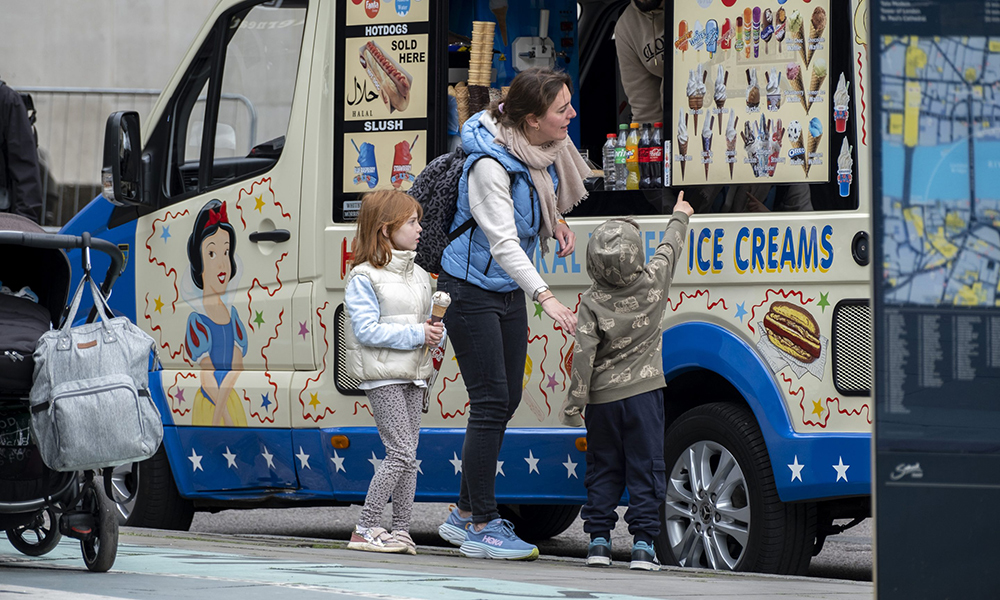
在悶熱的酷暑天氣,,人們渴望喝一瓶冰爽的蘇打水,,或者加入各種色素的冰棒,這是一個(gè)簡(jiǎn)單的供需問(wèn)題,。然而,,對(duì)于這些夏季的經(jīng)典零食,現(xiàn)在的消費(fèi)者似乎正在違背這一基本經(jīng)濟(jì)規(guī)律:人們并沒(méi)有大量購(gòu)買(mǎi)冰激凌,,原因是天氣太熱了,。
經(jīng)營(yíng)Mister Softee冰激凌車十多年的卡洛斯·瓦斯克斯在接受CNN采訪時(shí)表示:“特別炎熱的天氣,對(duì)生意反而不利,。這很奇怪,。人們不愿意走太多路去買(mǎi)冰激凌。冰激凌里的奶油會(huì)融化,,會(huì)弄臟衣服,,人們會(huì)要求額外提供紙巾?!?/p>
Mister Softee在美國(guó)通過(guò)播放音樂(lè)的卡車售賣圣代和冰棒而聞名,。最近幾年,公司業(yè)務(wù)面臨困境,。這家冰激凌銷售商面臨精品商店的競(jìng)爭(zhēng)和通脹的壓力,,不得不繼續(xù)漲價(jià)。此外時(shí)代已經(jīng)發(fā)生了變化,,美國(guó)的孩子們不再像以前的孩子們一樣在街頭玩耍,。但酷熱的夏天(2024年夏天是史上最熱的夏天)使該公司的情況進(jìn)一步惡化,因?yàn)闈撛陬櫩筒辉敢鉃榱速?gòu)買(mǎi)一個(gè)甜筒或冰棒排隊(duì),,在烈日下曝曬,,而且高溫導(dǎo)致冰激凌車更容易出現(xiàn)故障,而冰激凌車的維修成本高昂,。
就連全球零食品牌也感受到了壓力,。夢(mèng)龍(Magnum)和Ben & Jerry’s的母公司聯(lián)合利華(Unilever)在去年10月指出,英國(guó)高溫多雨的夏季,,導(dǎo)致公司冰激凌銷量減少了10%,。
聯(lián)合利華首席財(cái)務(wù)官格雷姆·皮特凱斯利當(dāng)時(shí)表示:“氣溫存在一個(gè)最佳平衡點(diǎn)。當(dāng)氣溫過(guò)高時(shí),,人們就會(huì)從吃冰激凌,,改為喝冷飲?!?/p>
啤酒公司可能不認(rèn)同皮特凱斯利的觀點(diǎn),,因?yàn)閻毫拥奶鞖庖矊?duì)他們?cè)斐闪擞绊?。喜力(Heineken)CEO多爾夫·凡·登·布林克將該品牌不及預(yù)期的銷售增長(zhǎng),部分歸咎于多雨的春季和夏初季節(jié),。足球比賽通常是銷售增長(zhǎng)的來(lái)源,,卻因?yàn)榻涤瓯蝗∠?024年在德國(guó)舉辦的歐洲杯,最后一場(chǎng)16強(qiáng)比賽因?yàn)槔子晏鞖獗煌七t,,觀眾被大雨淋濕,,德國(guó)各地的球迷區(qū)均被關(guān)閉。
酷熱的天氣,,冰冷的銷售
悶熱的天氣影響的不只是甜品和飲料公司,。各行各業(yè)的零售商越來(lái)越多地將銷售低迷歸咎于惡劣天氣。Investors’ Chronicle在1月份的一項(xiàng)分析中發(fā)現(xiàn),,在年初結(jié)束的一個(gè)季度,,有至少23家公司在業(yè)績(jī)報(bào)告中提到了天氣。
除了食品飲料公司外,,Superdry和Dr Martens等服裝品牌在業(yè)績(jī)報(bào)告中表示,,高溫抑制了公司銷售,因?yàn)橄M(fèi)者會(huì)直到今年晚些時(shí)候才開(kāi)始購(gòu)買(mǎi)保暖的衣服,。
除了讓消費(fèi)者望而卻步以外,,反復(fù)無(wú)常的天氣還威脅到對(duì)許多消費(fèi)品至關(guān)重要的商品的生產(chǎn)。南美洲部分地區(qū)遭遇了洪水和極端高溫,,導(dǎo)致農(nóng)作物更容易發(fā)生病害,,并且破壞了農(nóng)作物的生長(zhǎng)周期。因此,,橙子和咖啡豆的產(chǎn)量下降,。可可粉價(jià)格創(chuàng)歷史新高,,為避免漲價(jià),,巧克力公司不得不減少了棒棒糖的巧克力含量。
這些威脅是真實(shí)存在的,,但也可能被一些公司當(dāng)作借口,,掩蓋因其他原因?qū)е碌睦щy。根據(jù)Investors’ Chronicle的說(shuō)法,,服裝品牌Next和食品雜貨店Sainsbury’s等公司將去年秋季的銷售增長(zhǎng)歸功于溫暖的天氣,,但幾個(gè)月后又將銷售下滑歸咎于天氣。
分析報(bào)告認(rèn)為,,這可能意味著“將業(yè)績(jī)不佳歸咎于天氣,,表明公司對(duì)氣候的適應(yīng)能力欠缺,且?guī)齑婀芾聿蛔?,或者公司喜歡找借口,。”
GlobalData Retail的總經(jīng)理尼爾·桑德斯表示,,天氣很容易被當(dāng)作銷售下滑和業(yè)績(jī)令人失望的替罪羊,,特別是在公司沒(méi)有說(shuō)明天氣如何影響業(yè)務(wù),而高物價(jià)和通脹等其他因素繼續(xù)影響消費(fèi)者支出的情況下,。
桑德斯對(duì)《現(xiàn)代零售》表示:“我認(rèn)為將天氣作為理由必須具體說(shuō)明,。籠統(tǒng)地將客流量減少或行業(yè)的整體疲軟歸咎于天氣,,是非常站不住腳的,。”(財(cái)富中文網(wǎng))
譯者:劉進(jìn)龍
審校:汪皓
在悶熱的酷暑天氣,,人們渴望喝一瓶冰爽的蘇打水,,或者加入各種色素的冰棒,這是一個(gè)簡(jiǎn)單的供需問(wèn)題,。然而,,對(duì)于這些夏季的經(jīng)典零食,現(xiàn)在的消費(fèi)者似乎正在違背這一基本經(jīng)濟(jì)規(guī)律:人們并沒(méi)有大量購(gòu)買(mǎi)冰激凌,,原因是天氣太熱了,。
經(jīng)營(yíng)Mister Softee冰激凌車十多年的卡洛斯·瓦斯克斯在接受CNN采訪時(shí)表示:“特別炎熱的天氣,對(duì)生意反而不利,。這很奇怪,。人們不愿意走太多路去買(mǎi)冰激凌。冰激凌里的奶油會(huì)融化,,會(huì)弄臟衣服,,人們會(huì)要求額外提供紙巾?!?/p>
Mister Softee在美國(guó)通過(guò)播放音樂(lè)的卡車售賣圣代和冰棒而聞名,。最近幾年,公司業(yè)務(wù)面臨困境,。這家冰激凌銷售商面臨精品商店的競(jìng)爭(zhēng)和通脹的壓力,,不得不繼續(xù)漲價(jià)。此外時(shí)代已經(jīng)發(fā)生了變化,,美國(guó)的孩子們不再像以前的孩子們一樣在街頭玩耍,。但酷熱的夏天(2024年夏天是史上最熱的夏天)使該公司的情況進(jìn)一步惡化,因?yàn)闈撛陬櫩筒辉敢鉃榱速?gòu)買(mǎi)一個(gè)甜筒或冰棒排隊(duì),,在烈日下曝曬,,而且高溫導(dǎo)致冰激凌車更容易出現(xiàn)故障,而冰激凌車的維修成本高昂,。
就連全球零食品牌也感受到了壓力,。夢(mèng)龍(Magnum)和Ben & Jerry’s的母公司聯(lián)合利華(Unilever)在去年10月指出,,英國(guó)高溫多雨的夏季,導(dǎo)致公司冰激凌銷量減少了10%,。
聯(lián)合利華首席財(cái)務(wù)官格雷姆·皮特凱斯利當(dāng)時(shí)表示:“氣溫存在一個(gè)最佳平衡點(diǎn),。當(dāng)氣溫過(guò)高時(shí),人們就會(huì)從吃冰激凌,,改為喝冷飲,。”
啤酒公司可能不認(rèn)同皮特凱斯利的觀點(diǎn),,因?yàn)閻毫拥奶鞖庖矊?duì)他們?cè)斐闪擞绊?。喜力(Heineken)CEO多爾夫·凡·登·布林克將該品牌不及預(yù)期的銷售增長(zhǎng),部分歸咎于多雨的春季和夏初季節(jié),。足球比賽通常是銷售增長(zhǎng)的來(lái)源,,卻因?yàn)榻涤瓯蝗∠?024年在德國(guó)舉辦的歐洲杯,最后一場(chǎng)16強(qiáng)比賽因?yàn)槔子晏鞖獗煌七t,,觀眾被大雨淋濕,,德國(guó)各地的球迷區(qū)均被關(guān)閉。
酷熱的天氣,,冰冷的銷售
悶熱的天氣影響的不只是甜品和飲料公司,。各行各業(yè)的零售商越來(lái)越多地將銷售低迷歸咎于惡劣天氣。Investors’ Chronicle在1月份的一項(xiàng)分析中發(fā)現(xiàn),,在年初結(jié)束的一個(gè)季度,,有至少23家公司在業(yè)績(jī)報(bào)告中提到了天氣。
除了食品飲料公司外,,Superdry和Dr Martens等服裝品牌在業(yè)績(jī)報(bào)告中表示,,高溫抑制了公司銷售,因?yàn)橄M(fèi)者會(huì)直到今年晚些時(shí)候才開(kāi)始購(gòu)買(mǎi)保暖的衣服,。
除了讓消費(fèi)者望而卻步以外,,反復(fù)無(wú)常的天氣還威脅到對(duì)許多消費(fèi)品至關(guān)重要的商品的生產(chǎn)。南美洲部分地區(qū)遭遇了洪水和極端高溫,,導(dǎo)致農(nóng)作物更容易發(fā)生病害,,并且破壞了農(nóng)作物的生長(zhǎng)周期。因此,,橙子和咖啡豆的產(chǎn)量下降,。可可粉價(jià)格創(chuàng)歷史新高,,為避免漲價(jià),,巧克力公司不得不減少了棒棒糖的巧克力含量。
這些威脅是真實(shí)存在的,但也可能被一些公司當(dāng)作借口,,掩蓋因其他原因?qū)е碌睦щy,。根據(jù)Investors’ Chronicle的說(shuō)法,服裝品牌Next和食品雜貨店Sainsbury’s等公司將去年秋季的銷售增長(zhǎng)歸功于溫暖的天氣,,但幾個(gè)月后又將銷售下滑歸咎于天氣,。
分析報(bào)告認(rèn)為,,這可能意味著“將業(yè)績(jī)不佳歸咎于天氣,,表明公司對(duì)氣候的適應(yīng)能力欠缺,且?guī)齑婀芾聿蛔?,或者公司喜歡找借口,。”
GlobalData Retail的總經(jīng)理尼爾·桑德斯表示,,天氣很容易被當(dāng)作銷售下滑和業(yè)績(jī)令人失望的替罪羊,,特別是在公司沒(méi)有說(shuō)明天氣如何影響業(yè)務(wù),而高物價(jià)和通脹等其他因素繼續(xù)影響消費(fèi)者支出的情況下,。
桑德斯對(duì)《現(xiàn)代零售》表示:“我認(rèn)為將天氣作為理由必須具體說(shuō)明,。籠統(tǒng)地將客流量減少或行業(yè)的整體疲軟歸咎于天氣,,是非常站不住腳的,。”(財(cái)富中文網(wǎng))
譯者:劉進(jìn)龍
審校:汪皓
It’s a simple matter of supply and demand: Sweltering summer days leave people craving a condensation-slicked bottle of soda or a tongue-dying multicolored popsicle. But today’s consumers are defying a fundamental rule of economics when it comes to staple summer treats: They’re not buying as much ice cream because it’s just too hot.
“If the weather is really hot, it’s not really good for business. It’s weird,” said Carlos Vazquez, a Mister Softee truck franchise owner for over a decade, in a CNN interview. “People don’t want to have to walk too much. It’s creamy and melts and you get dirty and you ask for the extra napkins.”
Mister Softee, known for slinging sundaes and popsicles from its jingle-singing trucks across the U.S., has struggled in recent years. The ice cream purveyor faces competition from boutique shops and pressure from inflation to continue to raise prices, as well as contending with changing times in which American kids no longer play in the street like they once did. But steamy summers—including 2024’s hottest on record—have exacerbated its troubles, discouraging would-be customers from baking while standing in line for a cone or popsicle and leaving trucks more susceptible to breakdowns which are expensive to fix.
Even global confections brands are feeling the heat. Unilever, the parent company behind Magnum and Ben & Jerry’s, noted last October that a hot and rainy summer in the U.K. contributed to the company’s 10% drop in ice cream sales volume.
“There’s a sweet spot for temperature,” Unilever CFO Graeme Pitkethly, said at the time. “When it gets too hot, people move away from ice cream and buy a cold drink instead.”
Beer companies would disagree with Pitkethly, as they’re also reeling from severe weather. Heineken CEO Dolf van den Brink partially attributed the brand’s lower-than-expected sales growth to a soggy spring and early summer season. Soccer games, which are usually the source of sales boosts, have been rained out. A thunderstorm in the last round-of-16 game at the 2024 Euro hosted in Germany delayed gameplay, drenched fans, and shut down fan zones across the country.
Hot temps, cooling sales
Sweltering temperatures are the bane of more than just sweets and drink companies. Retailers across industries are increasingly blaming bad weather for sales woes. Investors’ Chronicle found in a January analysis that at least 23 companies mentioned the climate in earnings over the course of the quarter ending at the beginning of the year.
In addition to food and drink companies, clothing brands like Superdry and Dr Martens said in earnings reports that hot temperatures moderated sales as consumers didn’t start bundling up until later in the year.
Beyond turning off consumers, volatile weather has threatened the production of commodities essential for some consumer goods. Parts of South America have been pounded by flooding and extreme heat, making crops more susceptible to disease and disrupting growing cycles. As a result, orange and coffee bean production has stumbled. Cocoa prices have reached record highs, forcing chocolate companies to reduce the amount of the ingredient in its candy bars to avoid hiking up prices.
While these threats are real, they can also be a crutch for companies struggling for other reasons. According to Investors’ Chronicle, companies like clothing brand Next and grocery store Sainsbury’s pinned favorable sales last autumn to warm temperatures, despite citing the weather as a reason for slumps months later.
It could suggest “weather-blaming shows a business’ relative lack of climate adaptability and poor stock management—or a tendency to look elsewhere for excuses,” the analysis said.
Neil Saunders, managing director of GlobalData Retail, argued that weather can easily become a scapegoat for sales slumps and disappointments, particularly if companies don’t offer reasons as to how climate impacted business—and especially when other factors, such as sky-high prices and inflation, continue to batter consumer spending.
“I think weather excuses must be specific,” Saunders told Modern Retail. “Generally calling out the weather for reduced foot traffic or general sluggishness is often very weak.”






